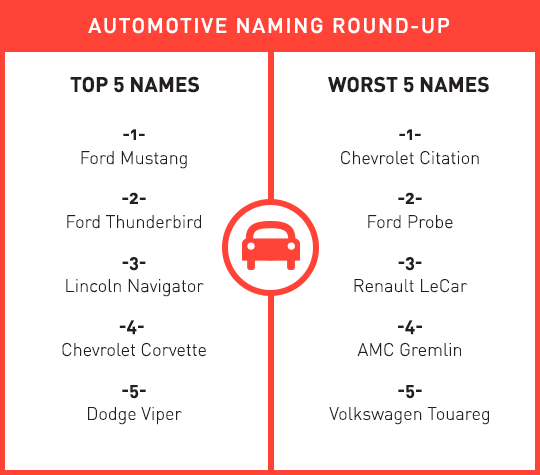Tag Archives: Auto
Car Naming VS Auto Naming: Are Real Names Superior to Alphanumeric Names?
Car names run the gamut from great names that evoke strong imagery and emotion like “Mustang” via alphanumeric naming systems to underwhelming names like “Golf” that fall flat and fail to impart a personality. What is behind these sometimes great, but more often bizarre naming strategies of these car companies? Inspired by a late night conversation I had with the CMO of a large European car brand the other day, the question lingered and I had to dig deeper:
A broad overview of naming strategies in the automotive industry reveals that mid-price companies like Volkswagen, Toyota, and the European car company Skoda opt for either using real words as names — a lá Toyota “Land Cruiser” — or made up names like Volkswagen “Jetta”. Higher-end brands like BMW and Lexus tend to use an alphanumeric naming strategy. By using real names, the consumer connects with the model of the car: A driver of a Ford Mustang is more likely to say “I drive a Mustang” as opposed to “I drive a Ford”. Alphanumeric names tend to place the emphasis on the make of the car, the brand, over the model: A driver of a Lexus is much more likely to report “I drive a Lexus” than to say “I drive an ES”. That is the power of Alphanumeric names, yet its downfall is that they offer little emotional connection to the actual car model and most often lead to frustrating confusion during the shopping process.
As you climb to the top of the pricing scale, with ultra luxury vehicles such as Bentley and Rolls Royce, the strategy of using real names and/or fabricated words for vehicles comes back into play. Words such as Phantom, Ghost, and Wraith depict the current line of Rolls Royce vehicles conveying a sense of mystery and intrigue.
Here is our round-up of the top 5 best car names and the top 5 flat tired names. We focused on ‘real’ names and not ‘auto’ names (as I may call them, pun and all) as the 750 Li Sedan (BMW) VS the IS 350 F Sport (Lexus) might have bored you.
What do you think? Did we miss any?

CATEGORIES: Blog Your Brand Launch: Naming



